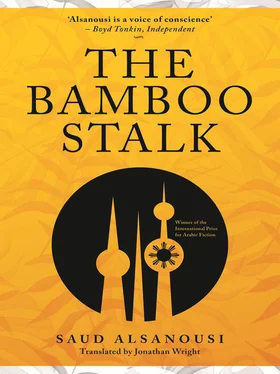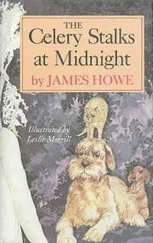If only my parents could have given me a single, clear identity, instead of making me grope my way alone through life in search of one. Then I would have just one name that would make me turn when someone called me. I would have just one native country. I would learn its national anthem. Its trees and streets would shape my memories and in the end I could lie at rest in its soil. I would have one religion I could believe in instead of having to set myself up as the prophet of a religion that was mine alone.
Sometimes I think of those minutes Rashid and Josephine spent on that boat when they became my father and mother. It’s madness that their minutes of pleasure should make my whole life such a misery.
If I had been born Muslim to a Kuwaiti father and a Kuwaiti mother, I would be living in a big house with a spacious room on the upper floor, with a forty-six-inch television, a walk-in closet and an en suite bathroom. I would wake up every morning to go to a job I had chosen myself, wearing a loose white thobe and a traditional headdress, at ease in my surroundings, instead of looking like an extra playing the role of an Arab in some Hollywood movie. I could look at the people around me and I wouldn’t need to look up to the sky to address them, and they wouldn’t need to look down to the ground to notice I was there among them. I could sit in expensive cafés and restaurants without people grumbling in whispers that people like me shouldn’t be in such fancy places. I could go to young people’s parties in the evening and have lots of Kuwaiti friends, friends like Ghassan and Walid. I could meet them in the diwaniya and go boating with them. I could go to the mosque on Fridays and listen to the man standing in the pulpit and understand what he was saying, instead of just raising my hands, imitating the men around me and repeating ‘Amen, amen’ like a parrot.
Or. .
If I had been born to a Filipino father and a Filipina mother, two of a kind, then I would be a Christian, comfortably off, living with my family in Manila, venturing every day into a mass of humanity, exposing my lungs and the pores of my skin to vehicle exhaust fumes. Or I might be a poor Muslim living at peace among my people in Mindanao in the south despite hunger and harassment by the government, or a rich kid living in a fancy house in wealthy Forbes Park in Makati City and going to a school that only the rich can afford, or a Buddhist of Chinese origin, working with my father in a shop in the Chinese quarter of Manila, burning incense in front of a statue of Buddha every morning because it’s good for business. Or if I had been born to Ifugao parents in the north of Luzon island, I would wear nothing but a loincloth all day. I would work in the terraced rice paddies in the mountains and sleep at night in a thatched house on stilts, guarded from evil spirits by statues of the anito. If I had been born a mestizo, I would have had my physical appearance as a feature to exploit, and I could have become a film star or a model in advertisements or a famous singer.
Or. .
If I’d hatched from the egg of a house fly, I would have zipped around the house and grown old in ten days, then given up the ghost within two weeks at the most.
If I were something clearly defined, anything. If if if. .
What a puzzle it is!
Did my baptism make me a Christian? Did I really embrace Christianity at that ceremony, which I attended at an age when I couldn’t even remember anything?
We all have our own private religions. We take from religions the parts we believe in and ignore the parts that our minds can’t grasp. We pretend to believe, we perform rituals we don’t understand for fear of losing something we are trying to believe in.
Despite all the wrongs I have suffered, I usually forgive people when they do me harm. I turn my left cheek to those who slap me on the right. I once loved Jesus Christ so much that I started seeing him in my dreams. He smiled and patted me on the head with a hand that still showed traces of the nail that went through it on the day he was crucified. So am I a Christian? But what about the times when I discovered myself through meditation? What about my constant desire to commune with the natural world around me? I used to sit under the trees on Grandfather Mendoza’s land, leaning against the tree trunks, until I hardly felt any sensations, which the Buddha says in his teachings are sources of suffering. I loved reading those teachings so much that I became like Ananda, the Buddha’s closest and most beloved disciple. Might I be a Buddhist without knowing it? What about my belief in the existence of one supreme and eternal god, unbegotten and without offspring? Am I a Muslim by default?
What am I?
It’s my destiny to spend my life looking for a name, a religion and a country. I won’t however deny my parents credit for helping me, unintentionally, to discover my creator, in my own way.
5
There was nothing special about my relationship with the Church in the Philippines. My visits were very infrequent. After I was baptised I didn’t go again till I was twelve. On that occasion I went with Aida and Pedro and his wife for my confirmation ceremony, the third sacrament I had undergone, after baptism and confession.
First confession had been organised by the school. Schools usually call in a priest to meet the third-grade children and take their confessions. I was nine when the priest came to see us and perform this rite. We lined up outside the classroom and the priest sat inside receiving the children one after another. The sins they confessed were what you would expect from children of that age — fairly insignificant, nothing more than ‘Once I lied to the teacher’ or ‘I disobeyed my mother’ or ‘I stole a pen (or a doll) from so-and-so’. But my sin was different, not a small sin you’d expect from someone as small as me. It seemed like a big sin to me, as big as Inang Choleng was old.
When I think back to my grandfather Mendoza’s land, I can’t help remembering three sets of creatures that shared the small piece of land with the family. There was Whitey, my grandfather’s dog, there were his cocks and then there was Inang Choleng. She lived alone and I never saw her outside her little house. All I ever saw of her was her upper half when she appeared behind her front door examining her daily bowl of food. My mother cleaned the old woman’s house once a week when grandmother was ill and after she died, because grandmother had done the cleaning before her. When my mother was away, Aunt Aida did it. The other women in the neighbourhood used to put bowls of food at her front door every morning and evening. When I was seven I was walking past Inang Choleng’s house one day on the way home from school and I was ravenously hungry. I saw a woman putting a bowl of food in front of Inang Choleng’s house. Usually the bowls would contain white rice and pieces of fruit or fried plantain, but that day I saw half a chicken lying in the bowl by the door. It made my mouth water. I stopped in front of her house, just a short distance away, but I didn’t dare go closer because I was afraid of the old woman. I stared at the bowl. All I could hear was the rustling of the leaves and the buzzing of the bees in the giant hive they had built in the branches of the mango tree over the witch’s house. I look around hesitantly. Should I do it? I wondered.
I looked at the handle of the wooden door.
What if she suddenly appears and drags me inside?
I started biting my fingernails.
I’d run off before she could catch me.
I took a step forwards.
What if she starves to death?
I looked down at the bowl on the ground by the door.
It looks delicious.
From somewhere nearby I heard a dog barking. It must have been Whitey.
Читать дальше












